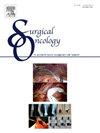Abdominal aortic calcification predicts poor prognosis for patients with gastric cancer who underwent curative gastrectomy
IF 2.4
4区 医学
Q3 ONCOLOGY
引用次数: 0
Abstract
Background
Abdominal aortic calcification is a pathological vascular disorder associated with various diseases and has recently been associated with the prognosis of various cancers. This study aimed to investigate the association between abdominal aortic calcification and prognosis in patients who underwent curative gastrectomy for gastric cancer.
Methods
We analyzed 251 patients who underwent curative gastrectomy for gastric cancer between January 2014 and February 2020. The volume of abdominal aortic calcification was assessed using routine preoperative computed tomography. The cutoff values were assessed using receiver operating characteristic curve analysis of the survival status at the 3-year follow-up, and set to 585.
Results
Higher abdominal aortic calcification volume was identified in 151 patients (60 %). Multivariate analysis showed that abdominal aortic calcification (P = 0.0120, P = 0.0430, respectively), and stage II or III disease (P = 0.0000, P=0.0000, respectively) were independent and significant predictors of the disease-free and cancer-specific survival. Additionally, patients with higher abdominal aortic calcification volume were significantly older and had a higher prevalence of hypertension, diabetes, chronic renal failure, and cardiovascular diseases.
Conclusions
Abdominal aortic calcification showed a strong preoperative prognostic indicator in patients undergoing curative gastrectomy for gastric cancer.
腹主动脉钙化预示胃癌行根治性胃切除术患者预后不良
腹主动脉钙化是一种与多种疾病相关的病理性血管疾病,近年来已被发现与多种癌症的预后有关。本研究旨在探讨胃癌根治性胃切除术患者腹主动脉钙化与预后的关系。方法分析2014年1月至2020年2月251例胃癌根治性胃切除术患者。术前常规计算机断层扫描评估腹主动脉钙化的体积。采用3年随访时生存状态的受试者工作特征曲线分析评估截止值,设为585。结果151例(60%)腹主动脉钙化体积增高。多因素分析显示,腹主动脉钙化(P = 0.0120, P= 0.0430)和II期或III期疾病(P =0.0000, P=0.0000)是无病生存和癌症特异性生存的独立且显著的预测因素。此外,腹主动脉钙化体积较高的患者明显年龄较大,高血压、糖尿病、慢性肾衰竭和心血管疾病的患病率较高。结论腹主动脉钙化是预测胃癌根治性胃切除术患者术前预后的重要指标。
本文章由计算机程序翻译,如有差异,请以英文原文为准。
求助全文
约1分钟内获得全文
求助全文
来源期刊

Surgical Oncology-Oxford
医学-外科
CiteScore
4.50
自引率
0.00%
发文量
169
审稿时长
38 days
期刊介绍:
Surgical Oncology is a peer reviewed journal publishing review articles that contribute to the advancement of knowledge in surgical oncology and related fields of interest. Articles represent a spectrum of current technology in oncology research as well as those concerning clinical trials, surgical technique, methods of investigation and patient evaluation. Surgical Oncology publishes comprehensive Reviews that examine individual topics in considerable detail, in addition to editorials and commentaries which focus on selected papers. The journal also publishes special issues which explore topics of interest to surgical oncologists in great detail - outlining recent advancements and providing readers with the most up to date information.
 求助内容:
求助内容: 应助结果提醒方式:
应助结果提醒方式:


